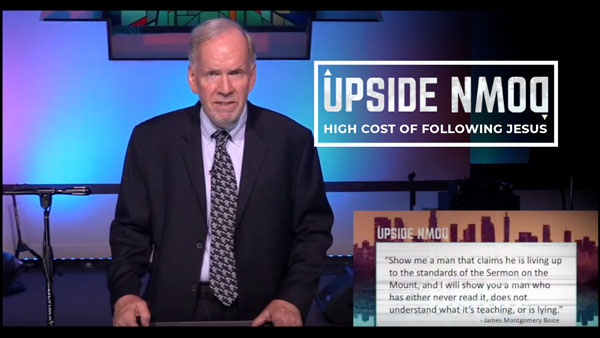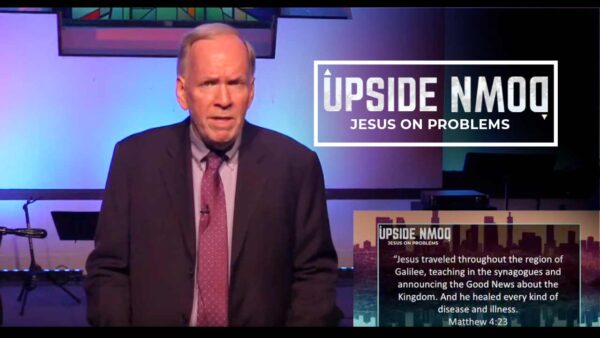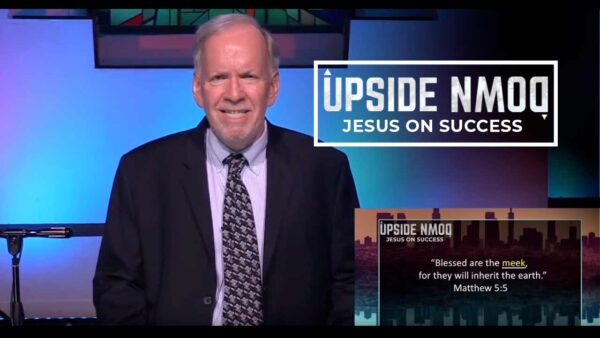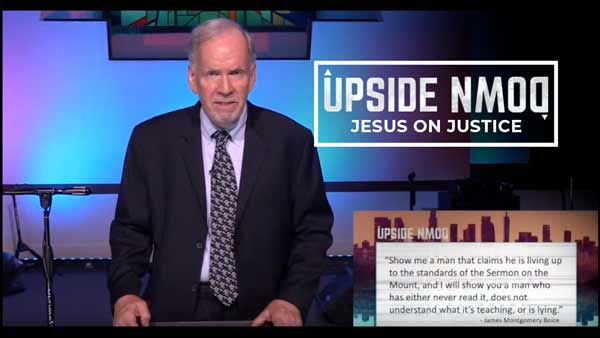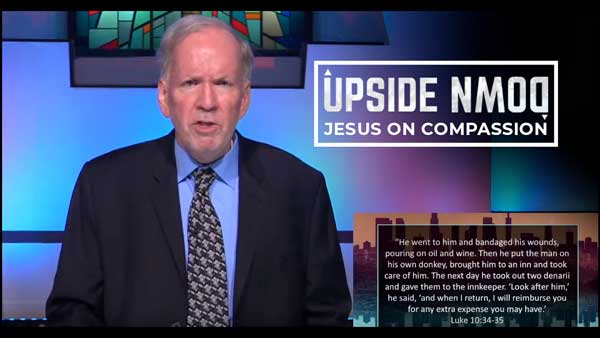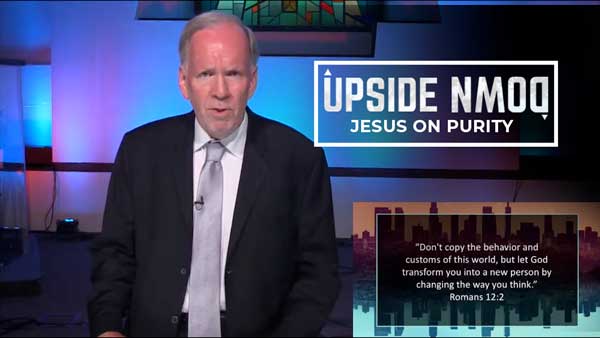Dr. Rick Mandl - July 5, 2020
What Is Success In The Eyes Of Jesus?
Sermon Manuscript: Upside Down Message 3- Blessed Are The Meek
Sermon preached by Dr. Rick Mandl, Eagle Rock Baptist Church, July 4 & 5, 2020 Recorded in Los Angeles, CA.
Welcome! Today we’re continuing our series “40 Days With Jesus.” It’s our 40 Day study of Jesus Sermon on the Mount and this weekend we’re looking at what Jesus had to say about “Jesus on Success.”
Success is something that all of us want, but it’s also something that’s difficult to define because it means different things to different people. How would YOU define success? What would success look like in your life? That question was put to some people on the street and here’s what they said. (VIDEO) The dictionary defines success as – “The attainment of wealth, fame and power.” And for most people, their definition of success includes one or more of those three.
King Solomon who was the WEALTHIEST... The most FAMOUS... And the most POWERFUL king in his time chased after and obtained all three of those and he also watched others as they pursued them. Here’s what he said, “Then I observed that most people are motivated to success by their envy of their neighbors. But this, too, is meaningless, like chasing the wind” (Ecclesiastes 4:4).
Today I want us to look at what Jesus says a person needs to do to be successful. Matthew 5:5, it’s your memory verse for this week. And there he says, “Blessed are the meek..." And underline that word “Meek.” “Blessed are the meek, for they will inherit the earth” (Matthew 5:3-6). Now if you’ll think about it for a second I think you’ll agree that no matter how you slice it... Owning the entire earth is success would meet most people’s definition of success. And that’s what makes this one of the strangest verses in the Bible. We don’t usually think of “meekness” as a pre-requisite for success. We look around and what we more often see is that... It’s the WEALTHY... It’s the FAMOUS and It’s the POWERFUL who wind up controlling things. But you need to notice that Jesus doesn’t say that the meek will TAKE OVER the earth, but rather that it will BE GIVEN TO THEM. It will be given to them as AN INHERITANCE. It is not earned, it is a gift. It’s something that we’re blessed with when we live a life that is pleasing to God. “Blessed are the meek, for they will inherit the earth.” This is arguably the most misunderstood of all the beatitudes.
What does it mean to be “meek”? We may not know what it means. But what we do know is this. Whatever it meekness is, we’re pretty sure we don’t want it. I mean think about it. Imagine that you are someone who has worked for me in the past, and you ask me if I can write you a letter of recommendation. And in that letter I say I have had the pleasure of working with PHIL for the past 2 ½ years. And while PHIL has many outstanding qualities as an employee, the one thing that sets PHIL apart from everyone else I have ever worked with is his “MEEKNESS”. Of all the people I’ve had the pleasure of working with, I’ve never met anyone who is “MEEKER’ than PHIL. He is by far the MEEKEST person I’ve ever met. You might not take that as a ringing endorsement. And again the reason is that we MISUNDERSTAND “MEEKNESS.”
To understand what it meekness is, it helps to know what it’s not. What it’s not: WEAKNESS. The dictionary won’t help you on this one, because once again if you look up the definition what you’ll see are things like... "PATIENT AND MILD." "TOO SUBMISSIVE," "EASILY IMPOSED UPON," "SPINELESS AND SPIRITLESS." That’s what the word has come to mean today... But it’s not what The Greek Word that Jesus used in this Beatitude means... What the word meant was... What it is: POWER UNDER CONTROL. The word was used to describe a MIGHTY STALLION whose power had been harnessed so that it would respond to the command of its master. The word meek was used to describe a WIND... Not the wind of a hurricane that was raging out of control... But a wind that sailors could look to, to fill their sails and propel their ship.
ARISTOTLE defined meekness this way. He said meekness – DEFINES A MAN WHO IS ANGRY ON THE RIGHT OCCASION WITH THE RIGHT PEOPLE AT THE RIGHT MOMENT FOR THE RIGHT LENGTH OF TIME -- Interesting how he said part of MEEKNESS is “ANGER.” But an anger that is under control. One way to understand the word is to look at some examples of it in the Bible. Examples of Meekness...
The first we see is Moses. In Numbers 12 and verse 3 it says that, "Moses was very humble - more humble than any other person on earth" (Numbers 12:3). That word "humble" is our word “MEEK.” Same word! What is PARTICULARLY IMPORTANT in this example of Moses, is the CONTEXT in which that statement is made. This verse describes a time when Moses’ sister MIRIAM and his brother AARON were criticizing him. Numbers 12:1-2 tells us that Miriam and Aaron began to talk trash about Moses because he had married a woman they didn’t approve of, Miriam and Aaron use this opportunity to rile up the people -- they say "Hey this isn't the only guy who ought to be in charge..." "Has the Lord spoken only through Moses?" they asked. "Hasn't he also spoken through us?" And the Lord heard this. And then there is this parenthetical statement that would be easy to read right past... Moses was very meek. In fact he was more meek than anyone else on the earth. And then in the verses that follow it tells how the Lord rebuked Moses sister and brother... How he rebuked Miriam and Aaron... And how he vindicated his servant Moses. Now you look at that story and you ask "What is the point of calling Moses meek right here in this context -- right between bitter opposition and God's vindication? I think the point is that Moses, at least at this point in his life had his power under control. Just when we would expect the text to say that Moses defended himself against the slander that his brother and sister were bringing... Instead it says "He was the meekest man on the earth." "He didn't say a word." "He waited patiently for the Lord."
By the way do you know how the story ends? Do you know what the Lord did? He struck Moses brother and sister with leprosy, as a punishment for their rebellion against Moses. And again the reaction of Moses is important. I mean, put yourself in his shoes. If I knew there were people criticizing me, and God gave them leprosy, I would be tempted to say "Isn't God good!" You are criticizing -- and what does God do? He nails you. But - What does Moses do? He prays for them – He prays, and God in his grace says "Okay Moses, if that's what you want we will put your sister outside the camp for just seven days and then after she has been outside the camp for seven days that will be discipline enough and she can come back in and be a part of us."
Moses wasn't perfect in his meekness – There were plenty of times when his anger was out of control. Like the time that he KILLED AN EGYPTIAN who was beating on one of Moses Hebrew brethren... Or the time when he came down from the mountaintop after meeting with God to receive the Ten Commandments only to find that while he was up on that mountain receiving the commandments, the people were busy at the foot of the mountain breaking them. And Moses was so angry that he took the tablets of stone that God had given him and smashed them on the ground. There were lots of times in his life when his anger was out of control, but at this point he lived in dependence on God. And that’s really what this word means...
For the believer meekness is: DEPENDING ON GOD. Not taking matters into your own hand, but trusting instead in the one who holds all things in his hand. And the one perfect example that we have of this in the Bible is Jesus. In Matthew 11:28-30, listen to how he describes himself. “Come to me, all you who are weary and burdened, and I will give you rest. Take my yoke upon you and learn from me, for I am gentle and humble in heart." And that word “GENTLE” is our word meek. JESUS WAS A MEEK PERSON. Yet when you study his life you find that He wasn’t afraid to confront people. What was one of the first things he did when he came to the Temple in John 2? He grabbed a whip and he drove out the money changers who were ripping off the people who were coming to worship. At the end of the ministry we find the same thing happening, again only this time there is no indication he used a whip -- he just went in without a whip, and turned over the tables. Jesus never defended his own rights, but he did defend the rights of his Heavenly Father.
What does a meek person look like? How does a meek person act? On your outline is a FIVE-PART ACROSTIC that sort of spells out what it means to have this quality of meekness. The ACROSTIC SPELLS OUT POWER. Meekness = Power. And I want us to think about 5 ways it should show in our lives P is for... PERSONALITY. People who are living in dependence on God are people who see their personalities more and more coming under God's control. Our personalities are made up of the different character traits and qualities that make us who we are. Some of those are positive, some of those are negative. So let's think for a moment about character traits.
There are POSITIVE CHARACTER TRAITS that we like to see in other people? Things like... Honesty, integrity, kindness. These are some positive character traits. And then there are NEGATIVE character traits? And if none come to your mind right away maybe you can think of the person sitting next to you. What are some negative character traits that we don't like to see? RUDENESS -- TEMPER -- All of us if we're honest have some character traits that could stand some refining. We have some rough edges.
JESUS' three closest friends had major character flaws and yet he didn't give up on them. PETER, JAMES, AND JOHN were Jesus' three best friends – within the 12 these were his inner circle. Luke chapter 9 kind of captures in a nutshell the personalities of these three. Jesus and the disciples were walking to Jerusalem and it was getting late so Jesus sent messengers ahead to see if they could get a room in the Motel 6 in Samaria. But when the Samaritans realized who it was who wanted to stay there -- they didn't want to have anything to do with them so they said "Sorry - - we’re full up - - there is no room for you in this town." When the messengers came back, James and John were the first to learn of what had happened. So they came to Jesus and said, "What do you think Lord, do you want us to call fire down from heaven and roast those people?" These were NOT GENTLE GUYS.
Another time James and John's mommy came to Jesus and said "Lord I've got a favor to ask. I know that you are going to establish a kingdom. And I want to talk to you about the seating assignments in that kingdom. If it’s not too much trouble I’d like to request that my two sons will get the best seats - - - one at your right, the other at your left, in the two highest places of honor when you establish your kingdom.” These guys and their mom had a LITTLE PROBLEM WITH LACK OF HUMILITY -- it's A CHARACTER FLAW.
And then there is PETER, the DISCIPLE WITH THE FOOT SHAPED MOUTH. Peter who said "Lord, even if everyone else deserts you -- even if I have to die for you -- I'll be there for you -- you can count on me." And THEN OF COURSE HE WENT STRAIGHT OUT AND DENIED HIM. But in spite of all of those character flaws and failings and personality defects -- Jesus saw the potential in them. And Jesus knew that if they would give him control over their personalities – If they would be honest and up front about the character defects in their lives - then God could change them and make them powerful agents for the kingdom of God. And that's exactly what happened to those three. And it can happen to you and me if we allow God to do his transforming work on our personalities.
Philippians 4:5 instructs us... “Let your gentleness be evident to all” (Philippians 4:5). Gentle people are people whose personalities - whose character traits are under God's control. I want to give you a challenge today, and that is to take the time this week to think about your personality and specifically about areas that maybe need to be honed off in your life -- the things that God might want to work on to form you and shape you to become more like Jesus. Can’t think of any? Let me give you some help... If there’s an area of your life where people say, “Well you need to understand, that’s just the way that he is... That might be how you are... but it doesn’t mean that that’s how God wants you to stay. -- I want to challenge you to commit those things to God. On the back of your notes it says, “MY NEXT STEP TODAY IS TO... Ask God to help me to depend on Him in the area of my... Personality. Allow him to change that area.
Paul writes to the Colossians and says... “Therefore, as God's chosen people, holy and dearly loved, clothe yourselves with compassion, kindness, humility, gentleness and patience” (Colossians 3:12). Compassion, kindness, humility, gentleness and patience may not be who you are, but they’re things God is calling you to become. Galatians 5 has list of things that God wants to grow in us. We call them “The Fruit Of The Spirit.” One of those is... “But the fruit of the Spirit is... gentleness” (Galatians 5:22).
As we grow in Christ, and he grows in us -- it not only affects our PERSONALITY -- but also our... OUTLOOK. I’m talking here about the way that we see other people. Outlook is a powerful factor in relationships. How we see other people will determine two things... It will determine our ATTITUDE toward them and it will also determine our ACTIONS. Philippians 2 tells us... “Don't just think about your own affairs, but be interested in others too, and in what they are doing. Your attitude should be the same as that of Jesus Christ" (Philippians 2:4-5). Jesus is the model. When he came to earth it wasn't TO BE SERVED, but TO SERVE. When your outlook comes under God's control you find yourself becoming MORE UNDERSTANDING AND LESS DEMANDING. Peter writes... “Learn to put aside your own desires so that you will become patient and godly...This will make possible the next step, which is for you to enjoy other people and to like them, and finally you will grow to love them deeply" (2 Peter 1:6-7). People who haven't given God control of their outlook, are for the most part very selfish people, and if you want to know one way to destroy any relationship -- it's to be selfish -- it works every time. We become gentle when our OUTLOOK is under God's control and we start to change - we become more understanding of others -- more sensitive to their needs -- not demanding our own all of the time.
Then the W in power is for... WORDS. The third characteristic of people who are living in dependence on God is that their words are under God's control. All of us know the power in words - they can be used to hurt or they can be used to heal. If we could play back a tape of the conversations that you have had this past week would we find your words to be gentle or harsh? Paul wrote to Titus and said "Remind the people... “To slander no one, to be peaceable and considerate, and to show true humility toward all men” (Titus 3:2). Peter wrote... “In your hearts set apart Christ as Lord. Always be prepared to give an answer to everyone who asks you to give the reason for the hope that you have. But do this with gentleness and respect,” (1 Peter 3:15). Are the words that we speak when we reach out to others words of gentleness?
There is a Catholic Monsignor, a father Joseph Murphy who tells the story of a group of nuns who attended a baseball game in a part of Texas where there were a lot of Southern Baptists who enjoyed picking on the Catholics. And so the nuns came in and sat down and began to watch the game and these guys in the back started to ridicule them saying "I think we ought to move to Oklahoma -- I hear there are less Catholics there than there are here." Another guy said "I think we ought to move over to Kansas I hear there are even less Catholics there." And the other fellow said "I think we ought to go to Alaska I hear there are almost no Catholics there." And one of the nuns turned around very sweetly and said "I think you fellows ought to go to hell - I hear there are no Catholics in hell." Now was that power under control? I don't know. Maybe even nuns need to work on gentleness in words. Gentle people are people whose words are under God’s control because they know the power of a carelessly spoken word.
Let me take you back to that question that I asked a couple of minutes ago... If we could replay a tape of the conversations that you have had this past week what would be discover about you through the words you’ve spoken. Would this be an area where you might need to apologize and say, “That’s just the way I am”? Or would this be an area where you’re words reflect Christ’s Lordship? If it’s an area where you’ve got room to grow, then make it your NEXT STEP this week to ask God to help you to depend on Him.
The “E” in P-O-W-E-R stands for... EXPECTATIONS. When someone disappoints you are you gentle or are you judgmental? If you are a Christian, then you know that there will be times when you will fail. Times when you will fall, and you will need someone to be there to help you up. Galatians 6:1 says, “Brothers, if someone is caught in a sin, you who are spiritual should restore him gently” (Gal. 6:1). Notice, spiritual people restore in a spirit of gentleness. There’s a temptation to be judgmental, to be "Holier than Thou." That's a wrong response for a Christian to have toward a brother or sister in Christ who is struggling with sin. What's your reaction to people when they mess up their lives? Do you secretly think, "I told you so, or I could see it coming, or it serves you right? Do you feel a sense of superiority? When the Prodigal Son came home after squandering half of his father's wealth, with his head hung in shame, he fully expected to get blasted by his dad. But his dad didn't say "See, I told you so --- I knew you were a screw-up!" He greeted him with open arms and said "My boy is home." He was gracious, not judgmental. Ephesians 4:2 says, “Be humble and gentle. Be patient with each other, making allowance for each others faults because of your love" (Ephesians 4:2). If you feel tempted to judge another person, just stop to remember how much God has forgiven you. The more you recognize God's grace to you, the more gracious and gentle you will be to others. Gentle people have their EXPECTATIONS under God's control.
The "R" in power is... REACTIONS. It’s how we react to opposition. One of the litmus tests of spiritual maturity is how you handle people who disagree with you. Listen to what Paul says in his last letter to Timothy. “And the Lord's servant must not quarrel; instead, he must be kind to everyone, able to teach, not resentful. Those who oppose him he must gently instruct, in the hope that God will grant them repentance leading them to a knowledge of the truth...” (II Timothy 2:24-25). Again... “He must gently instruct”.
If you have opposition and people are against you, how do you react? Jesus is our example... “He was oppressed and afflicted, yet he did not open his mouth; he was led like a lamb to the slaughter, and as a sheep before its shearers is silent, so he did not open his mouth” (Isaiah 53:7). 1 Peter 2:23 says, “When they hurled their insults at him, he did not retaliate; when he suffered, he made no threats. Instead, he entrusted himself to him who judges justly.” There was a time when Jesus would stand up - for the rights of others and defend them but the incredible picture of the Lord's power under control (his dependence on His Heavenly Father) is best seen during all of that arrest and trial and crucifixion -- that's the perfect picture of power under control. It's a wonderful story -- do you remember how it all began?
It was late at night and there was group of people -- soldiers and scribes, and leaders and they were all coming with torches and weapons it says in John 18... And they come to Jesus and he initiates the conversation. He says "Who do you want?" And they say "We want Jesus of Nazareth." And he says "I am he!" What happens to everybody? They all fall down on their wallets. Torches, swords, everything... They get back up and go "Who is this guy?" Peter suddenly realizes "Hey, I've got the Lord on my side." The Bible says he whips out his sword "Let's get em" and cuts off a guy’s ear. Jesus rebukes him and says, "Peter you've got it wrong that's not what this is about." “I've got to drink the cup of suffering -- I've got to go to the cross Peter -- can't you get it through your head?” So he takes the ear and heals the man and then goes on and allows these people to do whatever they want to Him. He allowed it – The power of the Son of God was set aside and he said “I've got to go through this because it's part of the process of me paying the price of the sins of the world.” Amazing -- and so Matthew tells us that Jesus in Matthew 26 had them spit in his face -- other accounts say they covered his head and struck him with their fists -- others slapped him and they said "Prophesy to us Christ -- who hit you?"
In Matthew 27:27 - the governor's soldiers took Jesus into the Praetorium and gathered a whole company of soldiers around him and they stripped him and put a scarlet robe on him -- they twisted together a crown of thorns and put it on his head and a staff in his right hand and knelt in front of him and mocked him and said "Hail, king of the Jews." Then they spit on him. Then they took the staff and began to strike him on the head again and again. After they mocked him -- they took off the robe -- they put his own clothes on him and led him away to crucify him. We hear about the flogging and the whipping but we sometimes forget the fact that all he had to do was speak "I am" and they would have fallen on their wallets - but He didn't do it. That's incredible power -- He said "I'll be quiet I am willing die." God says to us sometimes in our lives "I've got a cross mission for you -- your rights won't be protected -- don't use your power – depend on me -- and in that crucifixion greater things will happen."
A person who is depending on God is someone who is able to control their reaction because they’ve surrendered it to God’s control. GRADE YOURSELF ON THIS ONE... Proverbs 16:32 "He who is slow to anger is better than the mighty, and he who rules his own spirit than he who captures a city." When it comes to your reactions Are you depending on God? Are you entrusting yourself to Him, or are you saying vengeance is mine?” Our memory verse for this week contains a great promise for those who depend on God... “Blessed are the meek, for they will inherit the earth” (Matthew 5:3-6). What do you need in order to gain an inheritance?
I can think of two things... 1) Someone has to die. Or to be more specific, someone with some amount of wealth. People die every day, but not everyone leaves an inheritance. Some who have very little, don’t have anything to leave after their gone. Others try to live in such a way that whatever they have, they spend it all here. In order for you to gain an inheritance, someone who great wealth has to die. As you look at this beatitude, you realize that that has happened. Jesus died for you and for me, so that we could gain an inheritance, so that we could be what the Bible calls co-heirs, joint heirs.
But in order to receive an inheritance, you need more than just the death of someone with wealth. You need a second thing, and that is you need 2) A Relationship. To Inherit something requires a relationship. Earlier this month, Apple founder Steve Jobs died after a long battle with cancer. Even more tragic than his death as the age of 56, is the fact that we’re not sure of his eternal destiny. When it came to the question of his faith, biographers summed it up by saying “Raised Lutheran, died Buddhist.” Part of Steve Jobs legacy is that he served as the founder of one of the most successful companies of all time. Some of you may have seen the news report a couple of months ago that came out saying that Apple has more cash on hand than the United States government. By all estimations Steve Jobs died a very wealthy man. And yet, I don’t think any of you here today stand to inherit any of the money that Steve Jobs left behind. Regardless of how many Ipads, Ipods, or Iphones you may own, I don’t think you’re going to see any part of the inheritance that he left and the reason is that an inheritance requires more than the death of someone with great wealth... An inheritance requires 3)A Relationship.
You see, when we see God after we die, He is only going to ask us two questions. He is not going to ask how much money you made, or how many people knew who you were or how far you had advanced in your field. Those are all good things. Go for them. Be successful in each of those areas, but know that is not what God is going to ask you when you face Him after you die. Instead, He is going to ask you #1 What did you do with Jesus? Did you accept Him into your life? Did you accept the fact that He died on the cross so that your sins could be forgiven? Because the Bible says, that knowing Jesus is the only way to Heaven. That’s THE FIRST QUESTION - What did you do with Jesus?
And then A SECOND QUESTION #2 WHAT DID YOU DO WITH YOUR LIFE? You see, the first question—WHAT DID YOU DO WITH JESUS—that determines your eternal destiny, whether you are in Heaven or not. The second question—WHAT DID YOU DO WITH YOUR LIFE—determines your eternal reward. It determines what your reward will be in Heaven. How did you invest your life? Did you invest it in other people? Did you give God control of your life and live your life depending on Him? Or did you live for yourself? Seeking only fame, fortune and power. You see a wise person will have thought about how he used the things that God gave to him to make an eternal difference instead of spending his life worrying about accumulating more and more. Every day we make choices that demonstrate what it is we’re living for – whether it’s the here, or the hereafter. I love what the Martyred Missionary Jim Elliot said about this. “He is no fool who gives up what he cannot keep to gain what he cannot lose.” What’s sad is that so many of us do the opposite. We trade things that will last forever, for things that won’t. Jesus said, “You don’t have to do that.”
There are two paths. One is wide, it’s the one that most people choose. But it doesn’t lead to life. There is a narrow path, with a small gate, and that’s the path to true success. Let’s pray.
Recorded in Los Angeles, CA.
Scripture References: Matthew 5:5, Ecclesiastes 4:4, Numbers 12:3, Matthew 11:28-30, Isaiah 53:7, 1 Peter 2:23, Philippians 4:5, Colossians 3:12, Galatians 5:22, Philippians 2:4-5, 2 Peter 1:6-7, Titus 3:2, 1 Peter 3:15, Ephesians 4:2, Galatians 6:1, 2 Timothy 2:24-25
